RT62 CPCS Blue Card Renewal Mock Test with 114 Questions and Answers / A62 Crane Lifting Operations Supervisor
£15.00 Original price was: £15.00.£9.95Current price is: £9.95.
Master the Lift: Renew Your CPCS Blue Card with 114 Realistic RT62 Crane Supervisor Test Practice Q&As!
- Questions & Answers: based on the latest RT 62 Crane Lifting Operations Supervisor – CPCS Renewal Test Revision FACTSHEET
- Categories: A62 – Crane Lifting Operations Supervisor
- Number of Multiple-choice Questions: 114
- Format: PDF
- Delivery time: Instant download after checkout
- Refunds: No refunds once downloaded, unless you ordered duplicates by mistake.
If there are any issues with your download, please email CardRenewalTest@gmail.com and we’ll send it ASAP
Master Your CPCS Blue Card Renewal with Our RT62 Crane / Lifting Operations Supervisor Mock Practice Test
Unlock Success with Expertly Crafted Questions and Answers
Are you a Lifting Operations Supervisor aiming to renew your CPCS Blue Card? Fret not! Our RT62 Crane / Lifting Operations Supervisor CPCS Blue Card Renewal Mock Practice Test is your key to success. Whether you’re preparing for the first time or looking to improve your score, this comprehensive resource is designed just for you.
Why You Need Our Mock Practice Test
Renewing your CPCS Blue Card is a crucial step in ensuring you stay at the top of your game as a Lifting Operations Supervisor. Our mock practice test offers a dynamic learning experience, catering specifically to those who prefer an interactive approach over traditional study methods.
Benefits of Our Mock Practice Test
- Tailored to NOCN CPCS RT62 Factsheet: Crafted based on the latest NOCN CPCS RT62 Crane / Lifting Operations Supervisor factsheet, our questions closely mirror the content you’ll encounter in the real exam.
- Extensive Question Bank: With 114 thoughtfully designed multiple-choice questions, you get a broad spectrum of topics to reinforce your knowledge and understanding.
- Realistic Exam Simulation: Experience the real CPCS Blue Card Renewal Test environment, allowing you to familiarize yourself with the format and pacing of the actual assessment.
- Targeted Learning: Focus on areas where you need improvement. Our mock test provides detailed answers and explanations, enabling you to learn from every question.
Who Can Benefit from This Mock Practice Test?
- Lifting Operations Supervisors: Whether you’re renewing your card for the first time or aiming for a higher score, our practice test is your go-to resource.
- Those Who Failed Before: If you’ve faced challenges in the past, our mock test provides a practical, question-and-answer approach, making studying more manageable.
How to Pass the CPCS Blue Card Renewal Test
- Understand the Latest Factsheet: Stay current with the latest NOCN CPCS RT62 Crane / Lifting Operations Supervisor factsheet.
- Focused Practice: Our mock test allows you to focus on specific topics, helping you strengthen your weaker areas.
Your CPCS Blue Card is more than a certification; it’s a testament to your expertise as a Lifting Operations Supervisor. Invest in your future success by mastering the renewal process with our RT62 Crane / Lifting Operations Supervisor CPCS Blue Card Renewal Mock Practice Test.
Renew your card with confidence. Get started now!
These points cover essential aspects of lifting operations, emphasizing regulatory compliance, equipment knowledge, load handling, and safety measures:
Planning and Regulatory Requirements:
- The requirement for lifting operations to be appropriately supervised is prescribed within regulatory codes such as LOLER 1998.
- The role and duties of a Lifting Equipment (LE) crane/lifting operations supervisor are outlined in guidance like BS 7121.
- Regulatory guidance emphasizes that lifting operations must be appropriately supervised, proportionate to the risk.
- The appointed person (AP) or lift planner remains responsible for the execution and safety of the lifting operation but may delegate supervision.
- Delegated lift supervisors must give clear instructions, direct and supervise lifting operations according to the lift plan or method statement.
- Lift supervisors should consult the AP for plan amendments and need sufficient experience, expertise, and knowledge.
- A signaller is required if the lifting equipment operator cannot see the full path of the load.
- The lift plan should ensure that initial movements are directed by the slinger before handing control to the designated signaller.
- Rated Capacity Indicators (RCIs) on LE/cranes provide warnings when approaching or exceeding maximum rated capacity.
- Lift supervisors must ensure RCIs are not overridden during lifting operations to prevent over-lifting.
Lifting Equipment and Accessories:
- Lifting accessories include chain slings, wire rope slings, and fibre-type webbing slings, each with limitations.
- Accessories should be marked with Safe Working Load (SWL) and rated by Working Load Limit (WLL).
- SWL applies up to an included angle of 90 degrees; beyond this angle, the SWL may be reduced.
- If the included angle exceeds 120 degrees, the accessory cannot be used and must be substituted.
- When using a multi-legged chain sling, the open end of each hook should face away from the load.
- Attaching the master link of a multi-legged chain sling to the crane hook requires ensuring it’s large enough.
- When connecting multiple slings to the crane hook, a shackle of sufficient size and load capacity should be used.
Lifting and Controlling Loads:
- The lift supervisor, if delegated by the AP, must effectively brief all members of the lifting team.
- The lift supervisor should check understanding and provide opportunities for team members to ask questions.
- When lifting near other workers, avoid moving a suspended load above them whenever possible.
- If a load is left suspended briefly, the lift supervisor must ensure the operator stays with the crane.
- Consideration of proximity hazards, overhead power lines, and environmental changes is crucial.
- In complex lifts involving multiple cranes, coordination between operators should be determined in the lift plan.
Lifting Equipment Stability:
- Instability and overturns of LE/cranes can occur due to various factors, including changes in conditions and errors in calculations.
- Identifying or calculating the weight of a load before lifting is essential to avoid overloading.
- Proper siting and support of the crane minimize instability issues.
- The lift plan should account for dynamic forces, gross weight, and ground loads.
- The rated capacity of a crane applies only to a freely suspended load.
- Regular monitoring of wind speeds is necessary, and loads with large surface areas can be affected in high winds.
- Mobile-type cranes may need to travel on temporary roadways, requiring caution to prevent overturns.
Driving Safety:
- Driving too close to the edge of temporary roadways can lead to collapses, and the lift supervisor must ensure the driver is aware of potential issues.
6 reviews for RT62 CPCS Blue Card Renewal Mock Test with 114 Questions and Answers / A62 Crane Lifting Operations Supervisor
Add a review Cancel reply
Related products
CPCS Blue Card Renewal Tests
RT22 CPCS Blue Card Renewal Mock Test with 144 Questions and Answers / A22 Tracked Loading Shovel
CPCS Blue Card Renewal Tests
CPCS Blue Card Renewal Tests
RT49 CPCS Blue Card Renewal Mock Test with 141 Questions and Answers / A49 Loader Securer non STGO
CPCS Blue Card Renewal Tests
CPCS Blue Card Renewal Tests
RT34 CPCS Blue Card Renewal Mock Test with 130 Questions and Answers / A34 Crawler Tractor Dozer
CPCS Blue Card Renewal Tests
RT21 CPCS Blue Card Renewal Mock Test with 129 Questions and Answers / A21 Wheeled Loading Shovel
CPCS Blue Card Renewal Tests
RT33 CPCS Blue Card Renewal Mock Test with 129 Questions and Answers / A33 Agricultural Tractor
CPCS Blue Card Renewal Tests
RT19 CPCS Blue Card Renewal Mock Test with 123 Questions and Answers / A19 Grader


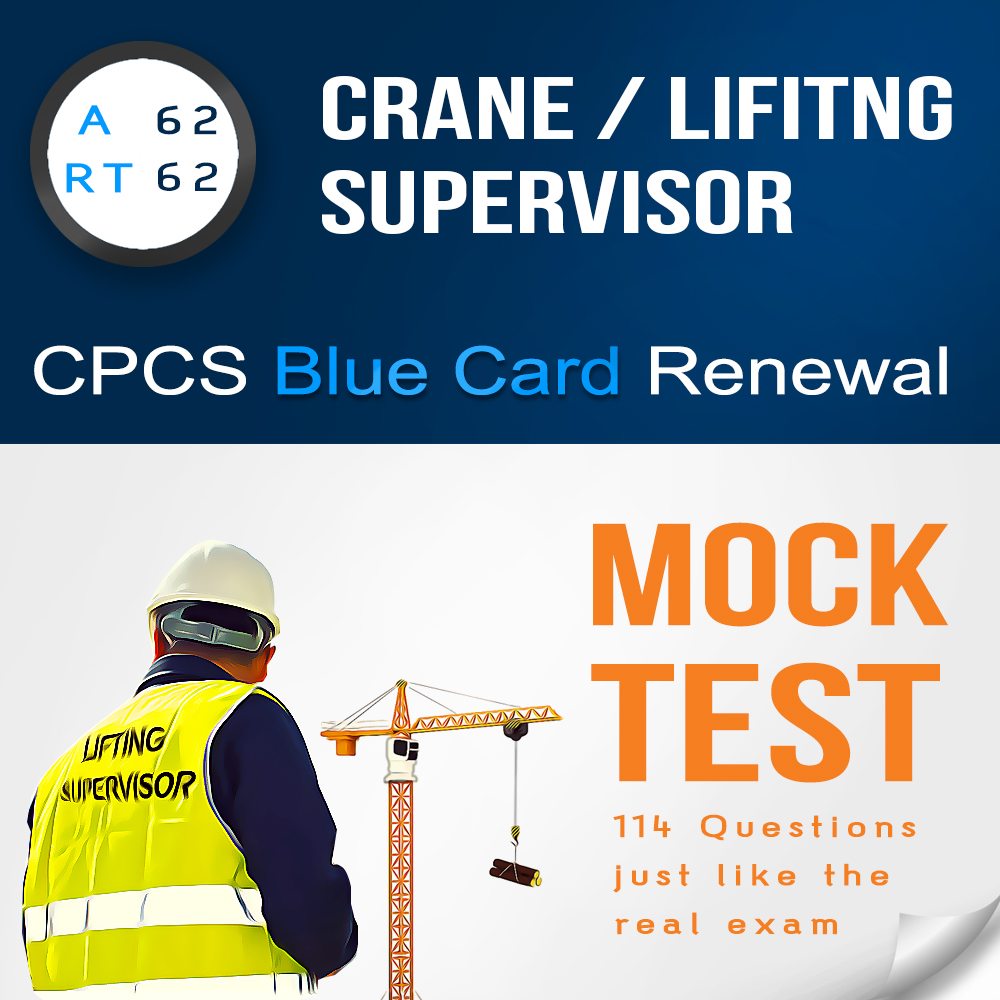
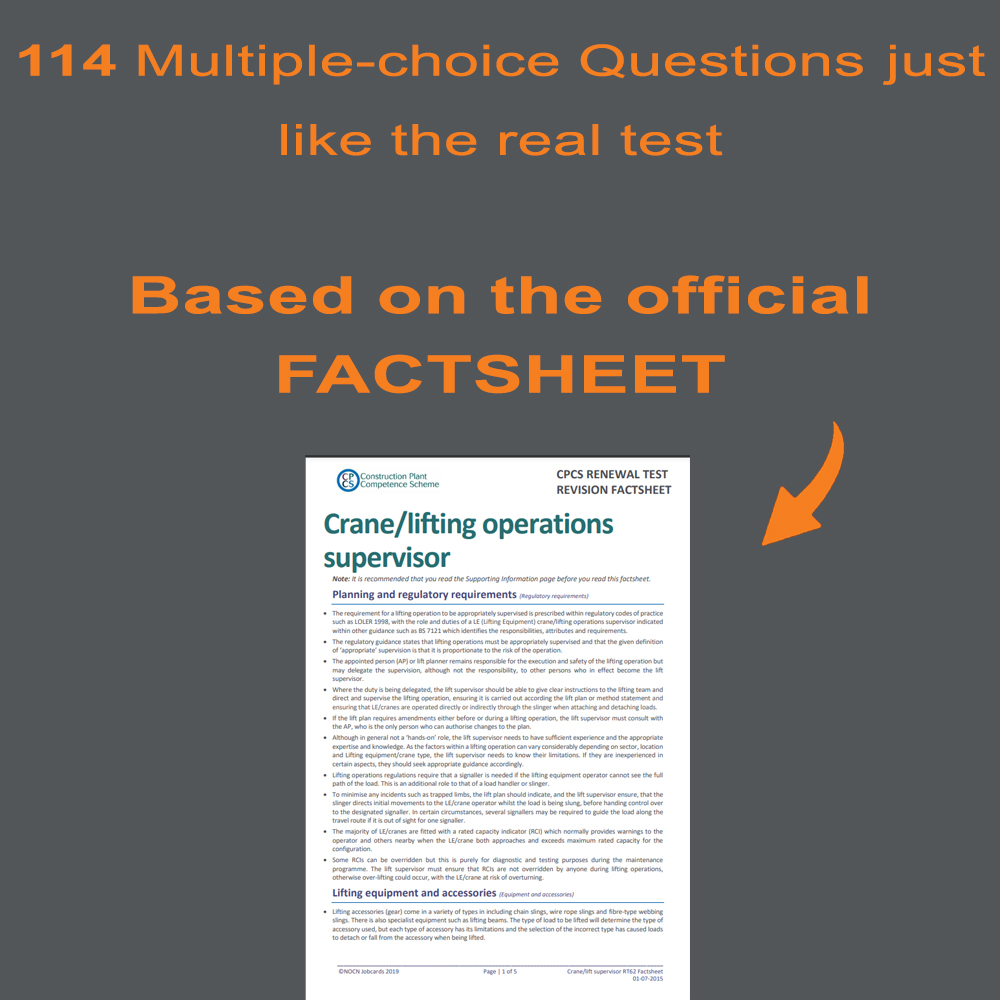

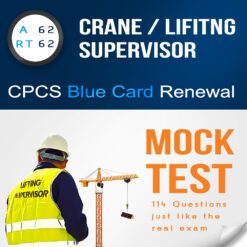

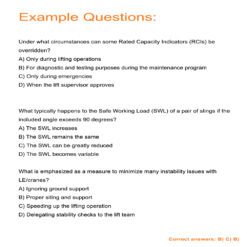
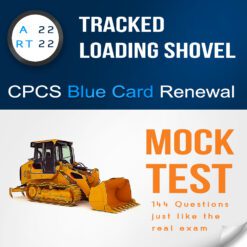
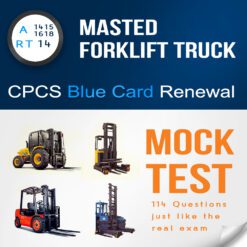


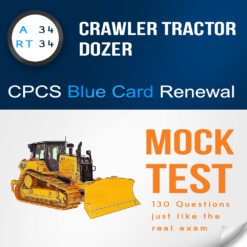



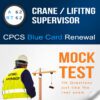
Miko –
This is quite useful guys! The questions on the test are not quite the same, they are just reworded differently but these mock questions for the crane supervisor renewal test are a really good practice!
Daz –
Cheers good work. Must’ve been a lot of work compiling these.
Ahmed González –
I ordered this yesterday and been reading. Been reading the questions and I seem to know my shit. Lol
Sangha –
Reading this was very helpful for my test 👍
Wilson –
I recommed for the lift superfisor renewal test
Yase –
Highly recommended